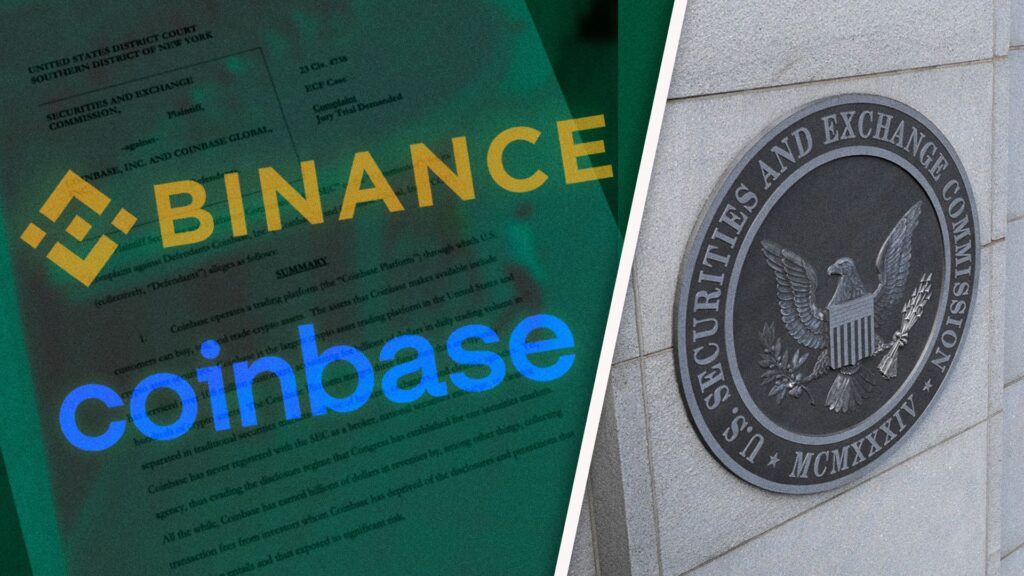- Binance crypto exchange has maintained that Binance.US is a separate entity that functions under a licensing agreement with the parent company.
- On January 12 2023, the SEC filed several lawsuits against Genensis Global Caital, LLC and Gemini Trust Company, LLC.
- District Judge Amy Berman Jackson of the D.C. District Court gave Binance crypto exchange a chance to describe any differences in their proposal.
The U.S Securities and Exchange Commission(SEC) has sharpened its teeth against digital assets adoption. Within the year, the crypto crackdown has significantly deterred the recovery of the ecosystem, forcing the exchanges to close down. However, the SEC took drastic measures to protect its citizens from experiencing another FTX scenario and has been flagging down any suspicious operations.
Their determination has, however, proved too effective, resulting in many crypto exchanges looking for a better environment to operate. Many have viewed it as a prevention measure and an attempt to enforce ignored crypto regulations, but others see it differently. Fortunately, Binance Exchange has picked up the gauntlet and is ready to defend itself and the entire crypto ecosystem against “rash and unfair” lawsuits the SEC has imposed.
Binance is the leading crypto exchange worldwide, and its attempts to stir and apprise will not be silent. Its mass sage all over the globe will rock the ecosystem. Essentially, the two organizations will go to court representing the clash everyone knew would come; decentralized and unrestraint finance systems versus Centralized regulatory bodies trying to seize control.
The trail of lawsuits by the SEC
With the FTX scenario still pending, the globe felt its rippling effect. In hindsight, the sudden crash of one of the largest crypto exchanges since the Golden Ages of Bitcoin significantly emptied various pockets. According to BBC, an estimated $8 billion of customer funds went missing.
This sudden vacuum triggered one of the worst dominoes effects the industry felt. Digital asset adoption globally plummeted globally, as did the faith in cryptocurrency. In less than a day, the entire crypto ecosystem lost 22% of its value within a day.
Veteran crypto traders who knew of prior losses from crypto hacks knew that the value of digital assets would hit rock bottom with the announcement. This, in turn, raised a fundamental issue silenced by the success of centralized exchanges; how to enforce crypto regulations properly.
Also, Read Binance Exchange calls out the recent SEC crackdown on crypto.
The SEC was among the first regulatory bodies to change their views on crypto instantly. For years they urged various exchanges and blockchain developers to register under regulatory bodies to ensure their operations were foolproof. At the time of the incident, SEC announced less than ten exchanges registered under it due to fear of centralized control. As a result, the FXT crash proved their point and thus gave them the perfect opportunity to enforce a crypto crackdown never seen before.
Ripple, Gemini and Genesis lawsuit
Within the year’s first month, the crypto crackdown bared its legal fangs on two crypto exchanges. On January 12 2023, the SEC filed several lawsuits against Genensis Global Caital, LLC and Gemini Trust Company, LLC. According to the SEC, both companies had offered and sold unregistered securities o retail investors through the Gemini Earn crypto asset; lending program.
Through the illegal act, they successfully raised billions of dollars worth of digital assets from various investors. This significantly worsened the entire crypto ecosystem causing more users to abandon both companies and opt for safer exchanges.

Gemini and Genesis were the first to face the wrath of the SEC in 2023.[Photo/Medium]
Furthermore, the SEC revealed that the Gemini Earn investors would not be allowed to withdraw their Crypto assets since, at the time, they did not have enough liquid assets. Unfortunately, after the FTX crash, the program was shut down, causing $900 million from 340,000 investors to “vanish.”
The SEC soon focused more of its efforts on crypto-related lawsuits. During the same month, the SEC was bent on winning its court case against the Ripple exchange. The Crytpo regulatory body claimed that Ripple illegally offered and sold XRP to investors before registering it as a security. This caused numerous suspicious activities within the organization that the SEC aimed to expose.
Kraken, Unbanked and Tron lawsuit
In February, the SEC turned its attention to bigger fish since they posed a similar threat to the FTX crash. Kraken crypto exchange, one of the top exchanges in the world, faced the wrath of the crypto crackdown. The SEC charged it with the selling and offering of unlawful securities.
Also, Read Robinhood to delist ADA, SOL, and MATIC amid SEC crackdowns on Coinbase and Binance.
Remember that, at the time, most crypto exchanges barely survived the low digital asset adoption rate. Thus to survive, Kraken had to shut down its U.S. crypto staking program and pay a fine of $30 million. The same month, the SEC sued Terraform Labs and its cofounder, Do Kwon.

SEC sued alleges Justin Sun promoted tokens without disclosure or registering them as securities.[TechCrunch]
The organization misled investors on several issues, and its most severe one revolved around its stablecoin, TerraUSD. Furthermore, their yield-baring Anchor Protocol and the LUNA token raised several unanswered questions.
Finally, even some loyal clients faced the wrath of the crypto crackdown. The Unbanked Exchange is among the recent victims forcing the organization to shut down its operation. However, the year’s highlight is the bold attempt at the two core tians for the crypto ecosystem and digital asset adoption; Coinbase and Binance crypto exchange.
Binance crypto exchange has had enough of the crypto crackdown.
The SEC decided to take the crypto crackdown to a new level by bringing down another titian of the ecosystem; Binance crypto exchange. It claims that the world’s largest crypto exchange and related entities operate as an unregistered broker and clearing agency. Furthermore, they have performed numerous unregistered offerings and sales of crypto assets and failed to restrict U.S. investors from accessing their services as per their crypto regulations.
This has significantly dealt a massive blow to the Binance crypto exchange, which denies all the allegations. Binance crypto exchange has maintained that Binance.US is a separate entity that functions under a licensing agreement with the parent company. Its founder set up BAM Management and BAM Trading in the U.S. and claimed they independently controlled the U.S. operations. Unfortunately, the SEC still pressed on with their allegation forcing the exchange to seek alternative means.
The crypto crackdown has effectively “polluted” the crypto environment of the U.S., causing many exchanges to flee to alternative governments. Binance is no exception since it officially announced its attempt at rebuilding its connection with Europe and Africa. Unfortunately, the SEC has made it challenging to transition further, claiming that Binance’s leading platform based outside the U.S. houses many U.S. customers. They claimed that the CEO, C.Z. eggs his employees to focus a substantial amount of effort on the most “valued” U.S. customers.

The SEC turned their sights on top crypto exchanges such as Coinbase and Binance.[Photo/The-Wall-Street-Journal]
With Binance’s crypto exchange currently standing at the pinnacle of the ecosystems, it has the right to defend itself. Due to the SEC’s relentless crypto crackdown, they have demanded the organization temporarily halt its operations. The exchange did not take this lightly and filed its first response highlighting the SEC’s absurd demands.
Also, Read A benchmark for blockchain networks: Cyberpunks lose 5, 2.5 ETH in a NEAR Protocol hacking attempt.
According to the official announcement, Binance.US sued the crypto regulatory body stating that the restraining order could erectile cripple its entire franchise. They said, “The SEC seeks unnecessary and unjustified relief. Far from requesting relief that is ‘carefully calibrated’ to ‘maintain[] the status quo’… the SEC’s proposed remedies would effectively end BAM’s business.”
District Judge Amy Berman Jackson of the D.C. District Court gave Binance crypto exchange a chance to describe any differences in their proposal. In addition, she ordered the SEC to explain what changes it wants so long as it’s acceptable to the organization.
Fortunately, the judge gave Binace a fighting chance that would not eventually end in an unprecedented shutdown.
A fight against the crackdown
In hindsight, the SEC initially decided to enforce practical crypto regulations ensuring rapid digital asset adoption. Unfortunately, the narration steadily changed along the way into something more damaging. SEC Chair Gary Gensler, unfortunately, expressed this new change more openly. During an interview with Bloomberg, he stated, “We don’t need more digital currency … we already have digital currency — it’s called the U.S. dollar.“
What started as a legal battle against unjust crypto exchanges soon turned into a war to diminish the industry altogether. The crypto crackdown has transformed the U.S. crypto ecosystem into an inhabitable breed and grown to digital asset adoption. Blockchain.com claimed that the only hostile take from crypto regulation s has opened up opportunities for other countries and nations. Africa, Asia and Europe have recently received significant attention from the crypto ecosystem.
Binance crypto exchange decided not to adhere to the initial demands of the SEC, a feat few have chosen. In truth, Binance might only see this as ensuring its business continuity, but it speaks volumes to the ecosystem. It attempted to defend itself and to put up a fight just like Ripple, who stood and fought but ultimately lost. Despite the outcome of the lawsuit, many view it as an attempt to develop some footwork for the crypto ecosystem.
If Binance manages to retain its operation in the U.S., it will be a win for the digital asset adoption community worldwide.
- SEO Powered Content & PR Distribution. Get Amplified Today.
- EVM Finance. Unified Interface for Decentralized Finance. Access Here.
- Quantum Media Group. IR/PR Amplified. Access Here.
- PlatoAiStream. Web3 Data Intelligence. Knowledge Amplified. Access Here.
- Source: https://web3africa.news/2023/06/14/featured/binance-set-to-challenge-crypto-crackdown/
- :has
- :is
- :not
- $UP
- 000
- 12
- 2023
- 32
- a
- acceptable
- accessing
- According
- Act
- activities
- ADA
- addition
- adhere
- Adoption
- africa
- After
- against
- agency
- Ages
- Agreement
- aimed
- All
- Allegations
- along
- already
- alternative
- altogether
- Amid
- among
- amount
- an
- Anchor
- and
- announced
- Announcement
- Another
- any
- around
- AS
- asia
- asset
- Assets
- At
- attempted
- Attempts
- attention
- based
- Battle
- bbc
- BE
- been
- before
- Benchmark
- Better
- bigger
- Billion
- billions
- binance
- Binance crypto exchange
- Binance exchange
- BINANCE.US
- Bitcoin
- blockchain
- Blockchain networks
- Blockchain.com
- Bloomberg
- blow
- bodies
- body
- bold
- both
- Bottom
- BREED
- Bringing
- broker
- business
- business continuity
- but
- by
- called
- Calls
- case
- caused
- causing
- centralized
- Centralized Exchanges
- ceo
- Chair
- challenging
- Chance
- change
- changed
- Changes
- charged
- chosen
- Citizens
- claimed
- claiming
- claims
- Clash
- Clearing
- clients
- Close
- CNBC
- cofounder
- coinbase
- COM
- come
- community
- Companies
- company
- connection
- control
- controlled
- Core
- could
- countries
- Court
- court case
- Crackdown
- Crash
- crypto
- crypto asset
- CRYPTO CRACKDOWN
- Crypto ecosystem
- crypto exchange
- Crypto Exchanges
- crypto hacks
- Crypto regulation
- Crypto regulations
- Crypto staking
- crypto traders
- crypto-assets
- cryptocurrency
- Currency
- Currently
- customer
- Customer Funds
- Customers
- D.C.
- damaging
- day
- decentralized
- decided
- demanded
- demands
- describe
- Despite
- determination
- develop
- developers
- DID
- differences
- digital
- Digital Asset
- Digital Assets
- digital currency
- disclosure
- district
- district court
- do
- Do Kwon
- Dollar
- dollars
- Dont
- down
- due
- during
- earn
- ecosystem
- Ecosystems
- effect
- Effective
- effectively
- effects
- effort
- efforts
- Eggs
- employees
- end
- enforce
- enough
- ensure
- ensuring
- Entire
- entities
- entity
- Environment
- essentially
- estimated
- ETH
- Europe
- Even
- eventually
- everyone
- exception
- exchange
- Exchanges
- experiencing
- Explain
- expressed
- Face
- faced
- Failed
- faith
- far
- fear
- feat
- February
- few
- fight
- fighting
- fights
- finance
- fine
- First
- Fish
- Focus
- focused
- For
- Fortunately
- founder
- franchise
- from
- FTX
- ftx crash
- functions
- fundamental
- funds
- further
- Furthermore
- Gary
- Gauntlet
- Gemini
- Gemini Earn
- Genesis
- Global
- Globally
- globe
- Go
- Golden
- Governments
- grown
- hacking
- hacks
- had
- Have
- he
- Highlight
- highlighting
- hindsight
- his
- Hit
- houses
- How
- How To
- However
- HTTPS
- Illegal
- illegally
- imposed
- in
- incident
- independently
- industry
- initial
- initially
- instantly
- Interview
- into
- Investors
- issue
- issues
- IT
- ITS
- itself
- Jackson
- January
- judge
- just
- Justin
- Justin Sun
- Kraken
- Kraken crypto exchange
- Kwon
- Labs
- largest
- Largest Crypto
- lawsuit
- Lawsuits
- leading
- Legal
- lending
- less
- Level
- Licensing
- lightly
- like
- Liquid
- LLC
- Long
- looking
- lose
- losses
- lost
- Low
- loyal
- Luna
- made
- management
- manages
- many
- Mass
- massive
- Matic
- max-width
- means
- measure
- measures
- might
- million
- missing
- Month
- more
- most
- Nations
- Near
- NEAR Protocol
- Need
- networks
- never
- New
- no
- numerous
- of
- offered
- offering
- Offerings
- official
- Officially
- on
- ONE
- only
- opened
- openly
- operate
- operation
- Operations
- opportunities
- Opportunity
- or
- order
- organization
- organizations
- Other
- Others
- out
- Outcome
- outside
- over
- parent company
- pending
- perfect
- performed
- picked
- platform
- plato
- Plato Data Intelligence
- PlatoData
- pockets
- Point
- Practical
- Prevention
- Prior
- Program
- Promoted
- properly
- proposal
- proposed
- protect
- protocol
- proved
- put
- Questions
- raised
- rapid
- Rate
- Read
- ready
- rebuilding
- received
- recent
- recently
- recovery
- register
- registered
- registering
- Regulation
- regulations
- regulatory
- related
- relentless
- relief
- remember
- representing
- response
- restrict
- result
- resulting
- retail
- Retail Investors
- retain
- Revealed
- revolved
- right
- Ripple
- rippling
- Rock
- s
- safer
- Said
- sales
- same
- scenario
- SEC
- Securities
- security
- see
- Seek
- Seeks
- seen
- Seize
- Selling
- separate
- Services
- set
- several
- severe
- she
- Shut down
- shutdown
- Sights
- significant
- significantly
- similar
- since
- So
- SOL
- sold
- some
- something
- soon
- Speaks
- stablecoin
- Staking
- started
- stated
- Status
- Still
- Stir
- substantial
- success
- Successfully
- such
- sudden
- sue
- Sue SEC
- sued
- Sun
- survive
- Survived
- suspicious
- Systems
- Take
- TechCrunch
- ten
- Terraform
- Terraform Labs
- TerraUSD
- than
- that
- The
- the world
- their
- Them
- they
- this
- threat
- threatens
- Through
- time
- to
- token
- Tokens
- too
- took
- top
- Traders
- Trading
- transformed
- transition
- triggered
- TRON
- true
- Trust
- truth
- TURN
- Turned
- two
- u.s.
- u.s. dollar
- Ultimately
- unbanked
- under
- unfortunately
- unprecedented
- unregistered
- unregistered securities
- us
- users
- Vacuum
- value
- various
- Versus
- victims
- View
- views
- volumes
- wants
- war
- was
- Way..
- we
- webp
- went
- were
- What
- which
- WHO
- will
- win
- winning
- with
- withdraw
- within
- without
- world
- world’s
- worldwide
- Worst
- worth
- would
- year
- years
- zephyrnet













